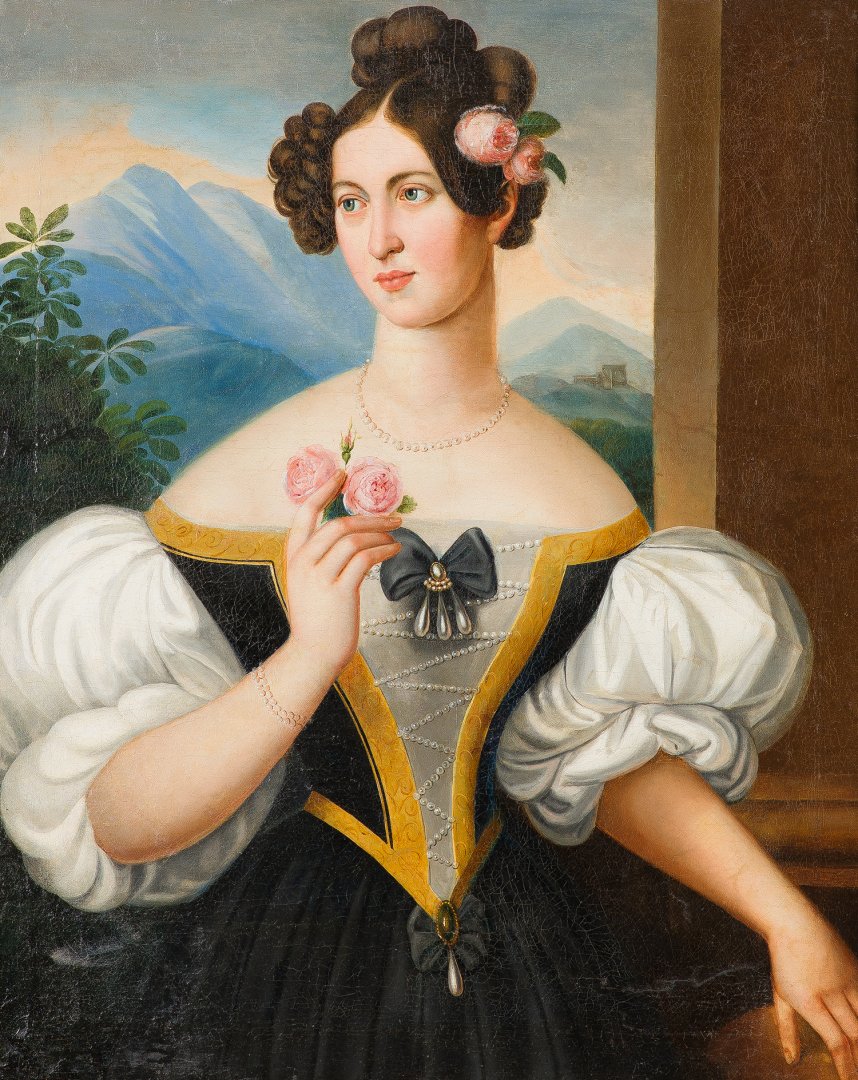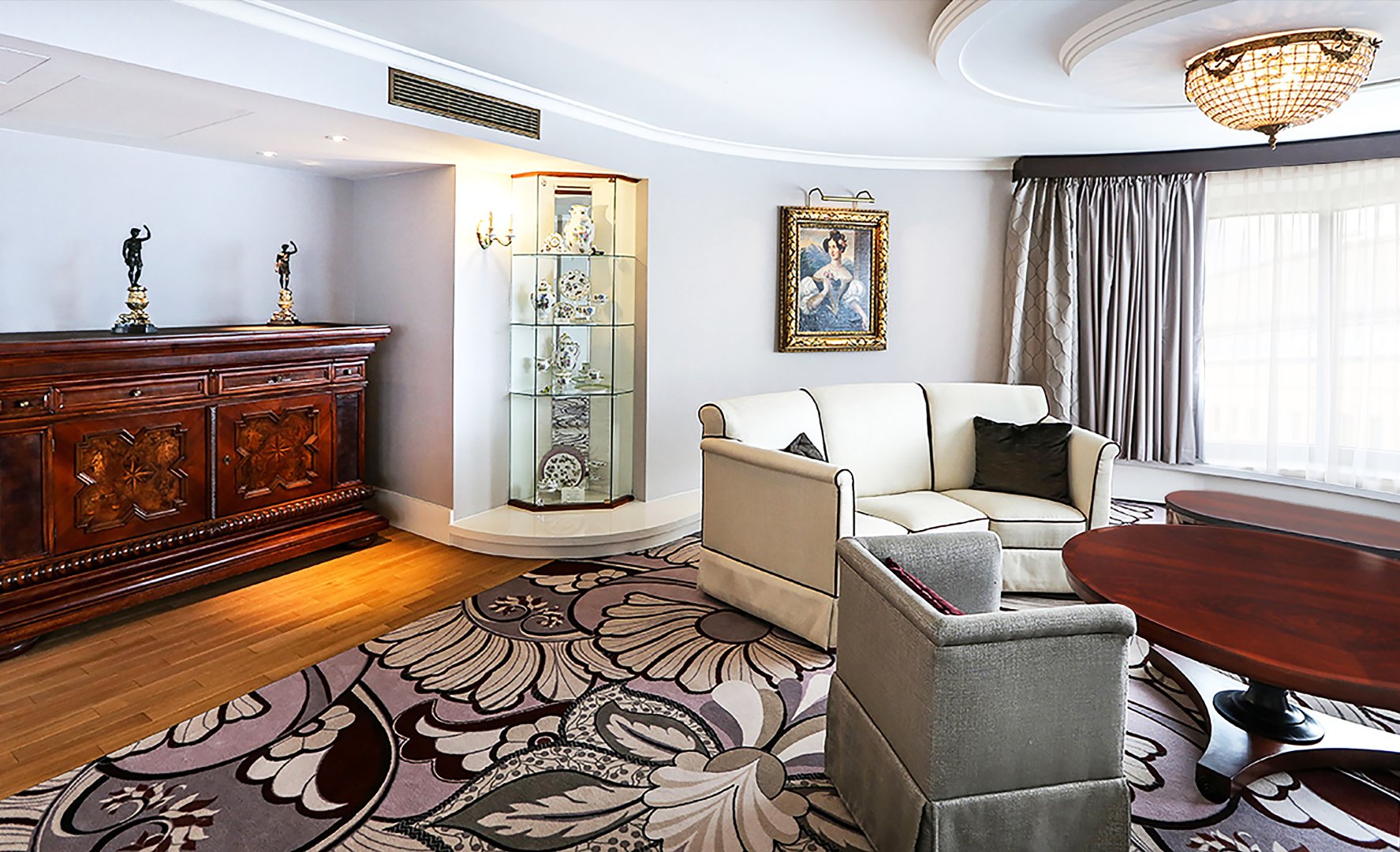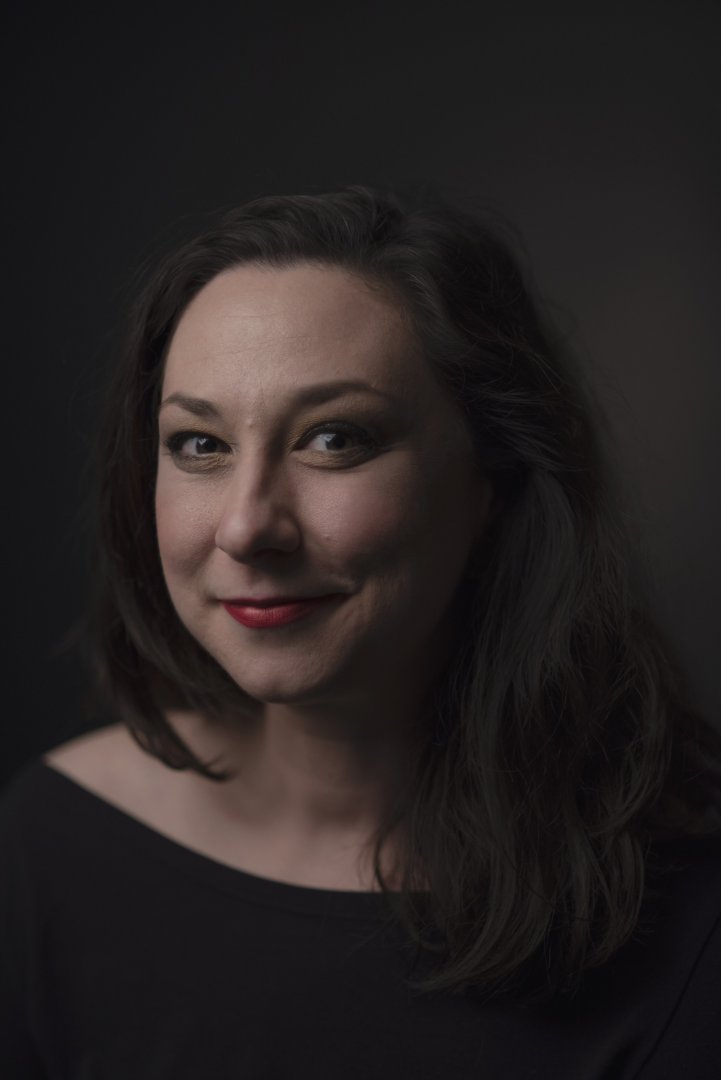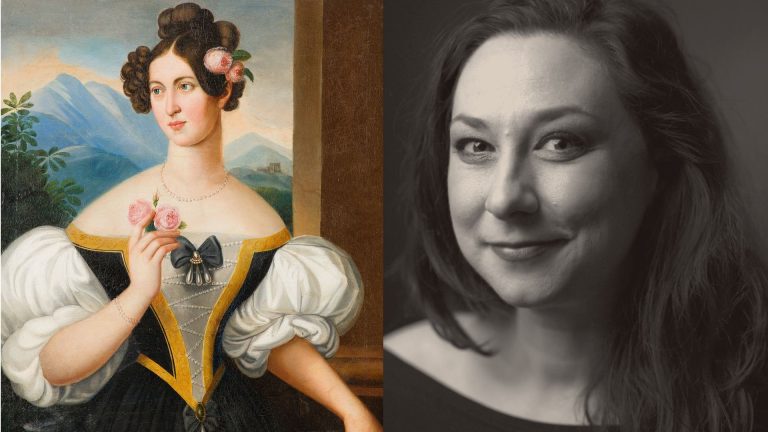Since its opening in 1992, Kempinski Hotel Budapest has been passionately collecting Hungarian artworks to decorate the hotel’s common areas, rooms, and suites. The Corvinus Art Collection now consists of nearly 1,500 pieces. To celebrate its 30th anniversary, the hotel invited five popular contemporary Hungarian writers to spend a night in one of the Corvinus Art Collection Suites and write a short story inspired by the artwork in the suite. The stories have been published in the Kempinski Hotel Corvinus Budapest’s publication Storytelling Suites. Below is the story of Anna Terék, inspired by unknown artist’s painting of a woman with rose.
Anna Terék: Lamplight
I’m looking at his back as he turns to the window, watching evening set in and the lights of the Citadella. The street bustles below, and from our suite window it looks as if life carried on just fine without us down there, like the world or Budapest never missed us for a beat. The lights are dwindling, the last rays of sunlight slide back down the buildings’ walls onto the sidewalk. You can see all the way to the Danube, the river glistening as it washes the heart of the city from all the weekday grime.
My heart feels tranquil now, it’s Saturday, evening is all but here, and I sip my coffee on the couch, seeing his back and his profile as he watches over the town and unremittingly waits for evening. He is silent, I am silent, despite the thoughts crawling around inside me. When we settled into the room, we talked a lot: I told him about my grandparents, my mother, my father – I didn’t understand it myself, how of all things it was their stories that came into my mind. The suite smells faintly of coffee, and the light itself has a hint of latte to it. My hand’s warmed by the porcelain cup, I brew a stiff espresso, and my stomach’s relaxing into it. As I wait for the coffee to dribble from the machine, I smooth the dresser’s carved pattern over with a stray finger. It’s like you could feel out the past. As if a carving could spell out bygone times and all that the wood had lived through, before a strong hand carved these patterns into it.
There was that summer I laid down on the rug every evening and left the lights off, just watching the lights receding from the room. Everything was quiet and motionless, I laid on the rug taking deep breaths, imagining what the room was like without me in it, when I wasn’t home. The chair stood undisturbed, and the table, and on it a book, the lamp out, and the window allowing the shadows to come creeping in.
I leave the lights off now and lay down on the soft carpet to watch his back, and the side of his face, and then the room. It’s quiet. It’s quiet inside me too.

I’d spent too much time on the road these last few months. Cramming clothes into suitcases, rushing to unpack in strange hotel rooms, tossing and turning in strange beds all night, airport coffee, running to catch that transfer, always taking off, always landing, but ultimately failing to arrive anywhere. If you’re on the road enough, it turns into a perpetual in-between, without ever arriving or finding your way home.
Formal dress and comfortable couch regardless, I lie on the carpet and watch the sculptures atop the carved dresser. Their metallic muscles flex, and they spill light onto the softly patterned carpet that seems to drink it right in. My eyes wander to the painting in the twilight, and I take in the distant blue mountains, her row of pearls and the faintly verdant roses in her hair and hands, and her gaze so full of tranquil anticipation, or perhaps yearning. Beside her the display cabinet is lined in proud porcelains, and they too trickle with light, attracting my eyes. I go up real close to look at the delicate porcelain butterfly, the intertwining ducks, and the saucers painted with delicate flowers. All this reminds me of my grandmother, especially the yearning look of the lady with the roses.
My grandmother was an odd person, and when I was little I often thought she was sulky, when she was merely lost in her thoughts. Her eyes, too, were always filled with yearning.
My grandmother also traveled a lot, moving house and changing city many times in her long life. She moved to the sea to follow my grandfather when they were newlyweds, and he was transferred to a medical practice in Montenegro. She got on the train all alone and arrived in a country where she didn’t even speak the language, but she ended up building a home there. Then they moved to the prairie, a dusty smalltown where they had to start everything over from scratch. Everywhere she went my grandmother ended up making a home, she fought and pulled her own weight, and to what extent she contributed to changing the world or bringing it to order may be anyone’s guess. Yet wherever her home base was, she enveloped her family in love, taking care of everyone, and even if she couldn’t always find what was needed, she could still build a home for her husband and children.

My grandmother had a thing for Herendi chinaware. She had a beautiful dining set with a butterfly motif, and at big family dinners she put on, when all her kids and their kids were seated and she’d bring out the butterfly china set, plates and cups, to serve the food in. My cousins and I would help set the table, and Grandma never seemed to worry we might drop a plate and smash that intricate Herendi porcelain.
I believe that’s what made those plates special to me: they had the feel of her trusting us to take care of them, because we knew they were special to her. We try to take care of the delicate moments of our lives, but it’s no use carrying them around inside our hearts everywhere we go when we don’t end up arriving anywhere.
I go to the desk and switch on the Herendi lamp, so the room suddenly floods with a glowing, cozy yellow light, which always brings to mind my grandmother’s house. We spent many nights at her place when I was a child, and whenever.
I slept at her house I would watch the yellow glow of the old table lamp struggling against the darkness, splashing over the table as my gran sat darning socks at its light, or reading a book, or just watching my own light-bathed, smiling face until I fell fast asleep.
I stand at the window and we watch the city lights together while the Liberty Statue on top of the Citadella holds up the sky. It’s good standing together in the darkness. The light of the table lamp seems to be getting stronger, the desk and the painting of the lady with black hair all awash in yellow light. I finally turn a light on, and the switch I flip puts a spotlight on the painting of the lady with the roses. I step up to observe her face, its look of longing. I’m looking to find myself in her, to find my past and my grandmother’s smile, because a smile is what she has on her face, a promise of the present as well as the future, and gradually, I smile with her.
Then I draw the bedroom curtains and sit at the makeup table, observing my own face and smile before looking at his smile as I see it mirrored when he stands behind me. As I lie on the bed and close my eyes in the lamplight, I can almost smell my grandmother, and I place my pearl necklace on the nightstand, yellow light, golden evening; then I stretch out on the bed. Here at last it feels like coming home.

Anna Terék (Topolya, 1984 – ) is a poet, dramatist and psychologist. Since 2007, she has published four volumes of poetry and one collection of dramatic works. Her poems have appeared in English, German, Spanish, Turkish, Polish and Croatian. She has won a number of literary awards. She lives and works in Budapest.











